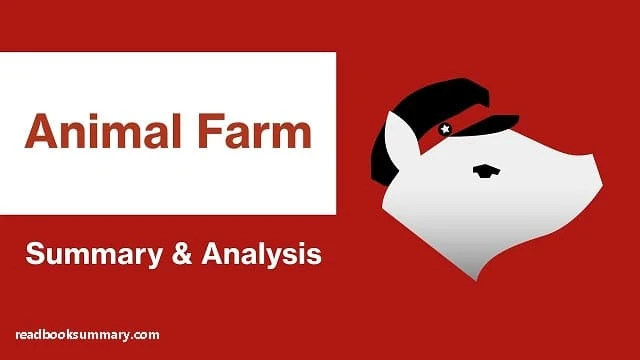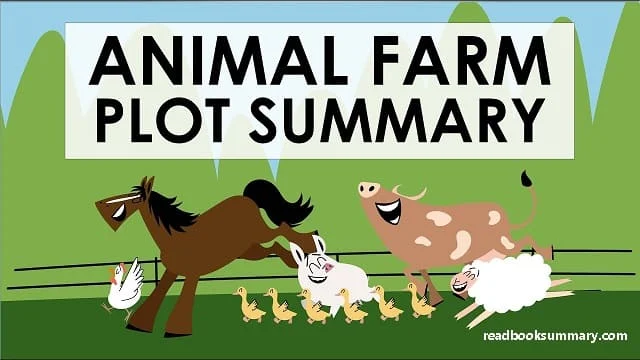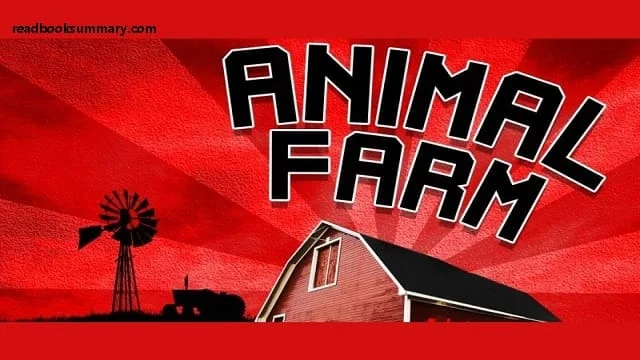Animal Farm Summary. it is a beast fable in the form of a satirical allegorical novella, by George Orwell, first published in England on 17 August 1945. It tells the story of a group of farm animals who rebel against their human farmer. hoping to create a society where the animals can be equal, free, and happy.
Ultimately, the rebellion is betrayed, and under the dictatorship of a pig named Napoleon, the farm ends up in a state as bad as it was before.
 |
| Animal Farm Book Summary |
Animal Farm Summary
One night, all the animals at Mr. Jones' Manor Farm assemble in a barn to hear old Major, a pig, describe a dream he had about a world where all animals live free from the tyranny of their human masters. old Major dies soon after the meeting, but the animals — inspired by his philosophy of Animalism — plot a rebellion against Jones.
Two pigs, Snowball and Napoleon, prove themselves important figures and planners of this dangerous enterprise. When Jones forgets to feed the animals, the revolution occurs, and Jones and his men are chased off the farm. Manor Farm is renamed Animal Farm, and the Seven Commandments of Animalism are painted on the barn wall.
Initially, the rebellion is a success: The animals complete the harvest and meet every Sunday to debate farm policy. The pigs, because of their intelligence, become the supervisors of the farm. Napoleon, however, proves to be a power-hungry leader who steals the cows' milk and a number of apples to feed himself and the other pigs. He also enlists the services of Squealer, a pig with the ability to persuade the other animals that the pigs are always moral and correct in their decisions.
Later that fall, Jones and his men return to Animal Farm and attempt to retake it. Thanks to the tactics of Snowball, the animals defeat Jones in what thereafter becomes known as The Battle of the Cowshed. Winter arrives, and Mollie, a vain horse concerned only with ribbons and sugar, is lured off the farm by another human.
Snowball begins drawing plans for a windmill, which will provide electricity and thereby give the animals more leisure time, but Napoleon vehemently opposes such a plan on the grounds that building the windmill will allow them less time for producing food. On the Sunday that the pigs offer the windmill to the animals for a vote, Napoleon summons a pack of ferocious dogs, who chase Snowball off the farm forever.
Napoleon announces that there will be no further debates; he also tells them that the windmill will be built after all and lies that it was his own idea, stolen by Snowball. For the rest of the novel, Napoleon uses Snowball as a scapegoat on whom he blames all of the animals' hardships.
Much of the next year is spent building the windmill. Boxer, an incredibly strong horse, proves himself to be the most valuable animal in this endeavor. Jones, meanwhile, forsakes the farm and moves to another part of the county, Contrary to the principles of Animalism, Napoleon hires a solicitor and begins trading with neighboring farms. When a storm topples the half-finished windmill, Napoleon predictably blames Snowball and orders the animals to begin rebuilding it.
Napoleon's lust for power increases to the point where he becomes a totalitarian dictator, forcing "confessions" from innocent animals and having the dogs kill them in front of the entire farm. He and the pigs move into Jones' house and begin sleeping in beds (which Squealer excuses with his brand of twisted logic).
The animals receive less and less food, while the pigs grow fatter. After the windmill is completed in August, Napoleon sells a pile of timber to Jones; Frederick, a neighboring farmer who pays for it with forged banknotes. Frederick and his men attack the farm and explode the windmill but are eventually defeated.
As more of the Seven Commandments of Animalism are broken by the pigs, the language of the Commandments is revised: For example, after the pigs become drunk one night, the Commandment, "No animals shall drink alcohol" is changed to, "No animal shall drink alcohol to excess."
Boxer again offers his strength to help build a new windmill, but when he collapses, exhausted, Napoleon sells the devoted horse to a knacker (a glue-boiler). Squealer tells the indignant animals that Boxer was actually taken to a veterinarian and died a peaceful death in a hospital — a tale the animals believe.
Years pass and Animal Farm expands its boundaries after Napoleon purchases two fields from another neighboring farmer, Pilkington. Life for all the animals (except the pigs) is harsh. Eventually, the pigs begin walking on their hind legs and take on many other qualities of their former human oppressors.
The Seven Commandments are reduced to a single law: "All Animals Are Equal / But Some Are More Equal Than Others." The novel ends with Pilkington sharing drinks with the pigs in Jones' house. Napoleon changes the name of the farm back to Manor Farm and quarrels with Pilkington during a card game in which both of them try to play the ace of spades. As other animals watch the scene from outside the window, they cannot tell the pigs from the humans.
You may also like to read: The 5 AM Club Summary
Animal Farm Quotes
- “All animals are equal, but some animals are more equal than others.”
- “The creatures outside looked from pig to man, and from man to pig, and from pig to man again; but already it was impossible to say which was which.”
- “Four legs good, two legs bad.”
- “The only good human being is a dead one.”
- “Several of them would have protested if they could have found the right arguments.”
- “This work was strictly voluntary, but any animal who absented himself from it would have his rations reduced by half.”
- “Man serves the interests of no creature except himself.”
- “Let's face it: our lives are miserable, laborious, and short.”
- “Can you not understand that liberty is worth more than just ribbons?”.
- “Man is the only creature that consumes without producing”.
- “Twelve voices were shouting in anger, and they were all alike. No question, now, what had happened to the faces of the pigs. The creatures outside looked from pig to man, and from man to pig, and from pig to man again; but already it was impossible to say which was which.”
- “All men are enemies. All animals are comrades”.
- “The distinguishing mark of man is the hand, the instrument with which he does all his mischief.”
- “If liberty means anything at all it means the right to tell people what they do not want to hear.”
- “Man is the only real enemy we have. Remove Man from the scene, and the root cause of hunger and overwork is abolished forever.”
- “Four legs good, two legs better! All Animals Are Equal. But Some Animals Are More Equal Than Others.”
- “His answer to every problem, every setback was “I will work harder!” —which he had adopted as his personal motto.”
- “they had come to a time when no one dared speak his mind, when fierce, growling dogs roamed everywhere, and when you had to watch your comrades torn to pieces after confessing to shocking crimes.”
- “Surely, comrades, you don't want Jones back?”.
- “He would say that God had given him a tail to keep the flies off, but that he would sooner have had no tail and no flies.”
- “There, comrades, is the answer to all our problems. It is summed up in a single word-- Man”.
 |
| animal farm synopsis |
 |
| george orwell animal farm summary |
 |
| animal farm short summary |
 |
| animal farm chapter summaries |
Questions and Answers about Animal Farm Plot
What is the main point of Animal Farm? The grand theme of Animal Farm has to do with the capacity for ordinary individuals to continue to believe in a revolution that has been utterly betrayed. Orwell attempts to reveal how those in power—Napoleon and his fellow pigs—pervert the democratic promise of the revolution.
What is the end summary of Animal Farm? At the end of Animal Farm, Pilkington and other human farmers come to eat dinner with the pigs at the farmhouse. As the other animals watch through the window, they find they are unable to tell pigs and humans apart. The pigs have started to dress and behave exactly like humans.
What are the main plot events of Animal Farm?
- Windmill - 5 year plans.
- Major's Skull - Lenin's body.
- Battle of the Cowshed - Russian Revolution.
- Animal Executions - Stalin's purge.
- Battle of the Windmill - WWII.
What are the 7 commandments in Animal Farm changed to? the original commandments have been reduced to one statement that encapsulates the authoritarian nature of the farm: “ALL ANIMALS ARE EQUAL BUT SOME ANIMALS ARE MORE EQUAL THAN OTHERS.
What is Animal Farm easily explained? Animal Farm is a political fable based on the events of the Russian Revolution and Joseph Stalin's betrayal of the cause. In the book a group of barnyard animals overthrow and chase off their corrupt human masters. They then set up an egalitarian society of their own, claiming that everyone is equal.
Who betrayed Animal Farm in the end? Boxer's betrayal marks the moment in which political power—embodied in Napoleon and the pigs—completely defeats the animals. In Animal Farm's final pages, the animals watch the pigs dining with human farmers, and find they are unable to tell the difference between humans and pigs.
What was the final rule in Animal Farm? By the end of the story, only one commandment is left on the side of the barn: "All animals are equal, but some animals are more equal than others." The degradation of the Seven Commandments symbolizes the oppressive conditions for the animals on the farm.
What are the symbols in the Animal Farm? Animal Farm represents the Russian Revolution of 1917. Old Major represents Karl Marx, Snowball represents Leon Trotsky, Napoleon represents Josef Stalin, Squealer represents propaganda, and Boxer is a representation for all the Russian laborers and workers.
Who is the protagonist in Animal Farm? In the 1954 film, Benjamin is voiced by Maurice Denham and is the main protagonist. In the film, it is Benjamin who leads the other animals in a counter-revolution against Napoleon when his abuses finally go too far. In the 1999 film, he is voiced by Pete Postlethwaite (who also played Farmer Jones in the film).
What is the tone of the Animal Farm The tone of Animal Farm is initially playful and lighthearted, but it becomes bitter as the story unfolds. The story begins with a tone suggesting the reader is embarking on a superficially silly story about ridiculous humans and talking animals.
What is the hidden message in Animal Farm? Orwell's message is this: Malicious groups of people, like the pigs, will continue to use propaganda to usurp power, to exploit the vulnerable, and to control the masses, unless courageous individuals spread the truth and stand up for those who cannot fight for themselves.
Why is it called Animal Farm? Animal Farm, known at the beginning and the end of the novel as the Manor Farm, symbolizes Russia and the Soviet Union under Communist Party rule. But more generally, Animal Farm stands for any human society, be it capitalist, socialist, fascist, or communist.
Why is Animal Farm a good story? Animal Farm is a great a depiction of the Russian Revolution of 1917 and the USSR. It shows how the leaders manipulates public over their believes (sometimes which are wrong). Animal Farm is an engaging eye-opening book that highlights the issues about betrayal, greed and inequality in human society.
Who is the most important animal in Animal Farm? Napoleon can be considered a protagonist in Animal Farm because he is a main or lead character throughout most of the story.
What is ironic in Animal Farm? Orwell makes use of irony from start to finish in Animal Farm. The pigs are constantly saying one thing while doing the opposite. They retell past events, framing themselves as heroes and exploiting the other animals' ignorance to their advantage.
Is Animal Farm a tragedy? In a similar way as the Russian Revolution led to much misery and many deaths in the common Russian population, the corresponding animal revolution in Animal Farm ends in tragedy. Through his novel, Orwell explains how political systems are used to curb individual freedom
What type of conflict is Animal Farm? Central to George Orwell's “Animal Farm” is the conflict between revolutionaries seizing power for the good of the people versus seizing power for their own enrichment. The book examines the question of how much power citizens can entrust to a leader who purports to make unilateral decisions for the citizens' benefit.
